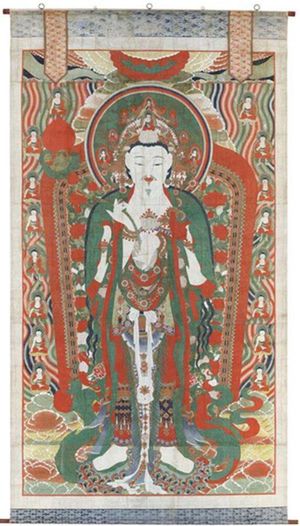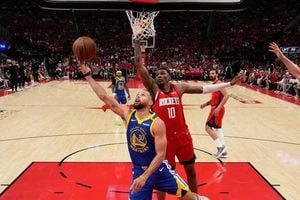Kate Nash has been making headlines lately—not just for her music but for her controversial decision to launch an OnlyFans account as part of her campaign called "Butts 4 Tour Buses." Nash, the British singer-songwriter famously known for her hit song "Foundations," released back in 2007, is using this platform to cover the staggering costs of her current UK tour.
This innovative, and some might say provocative, approach reflects the harsh realities of the modern music industry, which has become increasingly unsustainable for many artists, especially post-pandemic. Nash recently demonstrated her dedication to discussing these issues by protesting outside the London offices of Live Nation and Spotify earlier this week, driving up with fire trucks to draw attention to her plight.
Despite her creative tactics, not all of Nash’s peers have embraced her newfound venture with open arms. A prominent criticism has come from the indie band Lottery Winners, who took to social media to challenge Nash’s assertion of being the spokesperson for the "working class musician", largely due to her BRIT School heritage. They pointed out the irony of her background, implying it diminishes her credibility on the struggles faced by artists today.
The BRIT School, where Nash honed her craft, has produced notable talent like Adele, Amy Winehouse, and Leona Lewis. While it stocks several working-class success stories, Lottery Winners' criticisms highlight their frustration with Nash’s portrayal of herself as someone championing the underdog, considering the privilege of having attended such a prestigious institution.
"I don’t mind if you went to private school and Brit School, I'm happy for you. But when did you become the spokesperson for the 'working class musician'? No thanks mate," they expressed on Twitter, sparking heated discussions among fans.
Interestingly, the mix-up about recent BRIT Award nominations perhaps shows a disconnect within their narrative, as it’s unclear if they pointed to this year’s nominees—only two of whom attended the BRIT School—or whether they meant the previous awards, where none did.
This drama spotlights the growing discontent within the music industry as artists grapple with mounting pressures. Many have leaned on alternative revenue streams, as highlighted by Nash’s move to OnlyFans. The platform enables artists to generate income from subscribers, tapping directly from their fan base without relying solely on dwindling streaming royalties.
Lily Allen recently opened up about her own experiences on OnlyFans, sharing sobering statistics indicating she earns more selling pictures of her feet on the platform than through her extensive presence on streaming services like Spotify. An artist with nearly eight million monthly listeners, Allen’s comment encapsulates the frustrations many musicians feel about fair compensation within the industry. "Imagine being [an] artist and having nearly eight million monthly listeners on Spotify but earning more money from having 1000 people subscribe to pictures of your feet," she noted, offering insight on the disparity of revenue opportunities.
According to industry trends, there are various revenue streams available to musicians, including sync licenses, performance rights, physical sales, digital downloads, and streaming. Currently, streaming royalties from platforms like Spotify comprise over 67% of global recorded music revenue, yet much of this money is siphoned off at many levels before it reaches artists directly.
For artists, the reality is stark. Many receive only between $0.003 and $0.005 per stream after accounting for the multiple parties involved—record labels, distributors, and performance rights organizations—each taking their portion of the pie. This has led musicians to rely heavily on touring and live performances to sustain themselves financially.
Nash’s desperate measures and vocal protests mirror broader trends, where artists are forced to bypass traditional methods to access revenue. Surveys indicate as many as 72% of artists reported making no profit from recent tours, with 25% operating at losses. The music community, regardless of background or schooling, struggles significantly when trying to balance artistic ambitions with financial realities.
Emerging artists, such as Donnie Campbell from the indie band Waverley, noted the futility of chasing income purely through streaming. "We don’t expect to see any money from streaming. The metrics on streaming are all nice things, they assure you it’s going in the right direction, but it’s not sustainable," he affirms, emphasizing the demand for live performance revenues to reinvest back to the music. Waverley, which boasts around 1,227 monthly listeners on Spotify, faces significant hurdles. Campbell describes breaking even as the primary goal with their gigs, where profits are often swallowed by venue costs and promotional fees.
For musicians today, the dream of making it big often feels increasingly out of reach. Many artists report being forced to adapt innovative strategies, like Nash’s OnlyFans move, just to keep their ambitions alive. With industry structures deemed broken by many, the question remains: will the tides ever turn toward fair compensation for artists, or will people like Nash and Allen continue to navigate the murky waters of creative entrepreneurship? Music may be more accessible than ever, but for those creating it, the financial game remains at best, complicated.
Interestingly, this dialogue sheds light on the music industry’s shifting dynamics, compelling spectators and professionals alike to re-evaluate the role of wealth, education, and opportunity. Nash's campaign, instead of simply generating controversy, might just ignite discussions on fairness and equity, transcending social media exchanges and demanding action. The casual dismissal of her stance reveals more about industry inequalities than the artist herself—a narrative underscoring everyday struggles faced by numerous musicians chasing their dreams against the odds.



